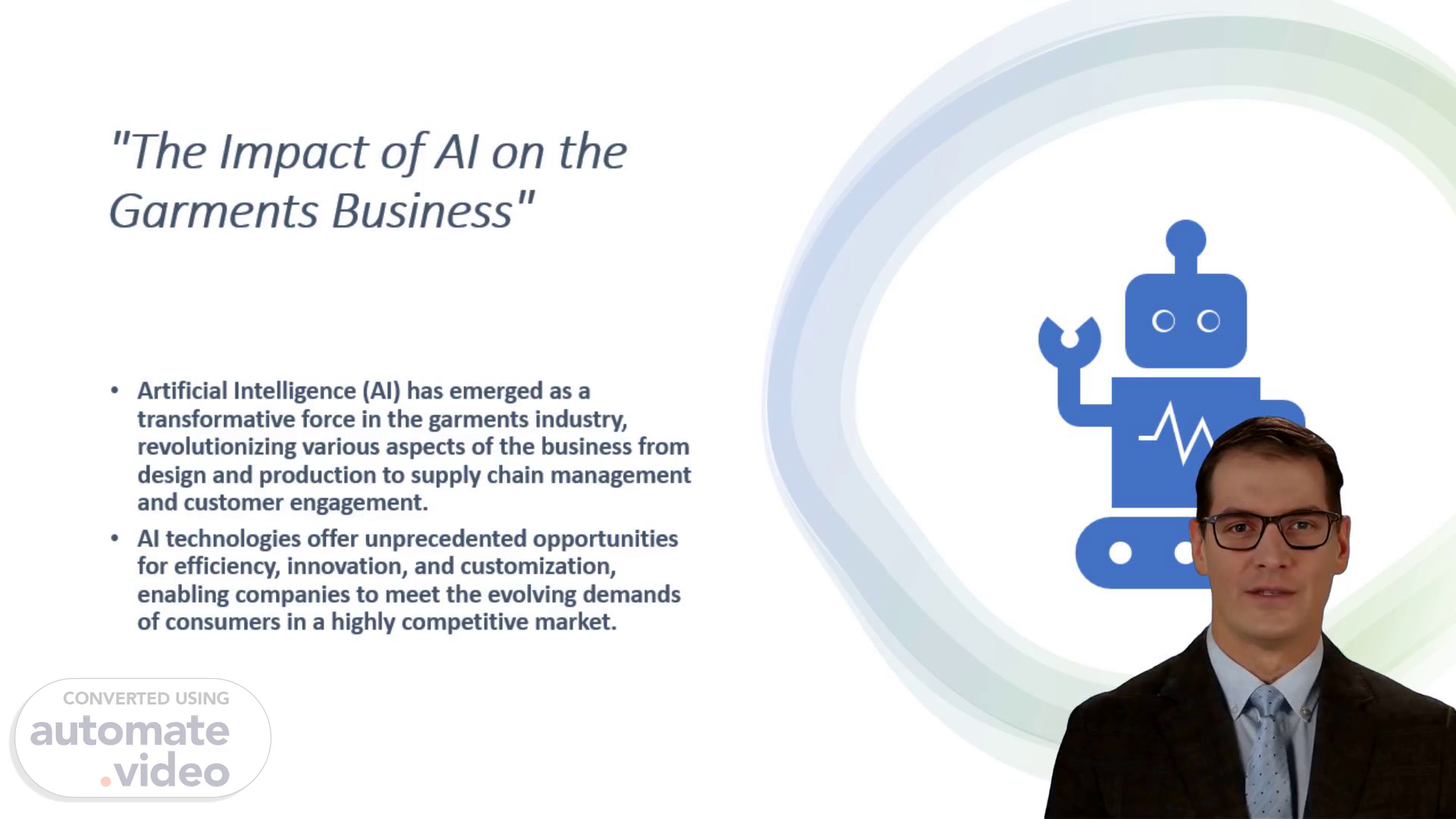
"The Impact of AI on the Garments Business"
Scene 1 (0s)
[Virtual Presenter] In the garments industry AI is providing new ways to improve operations save costs increase productivity and create new products and services. AI can help companies identify trends and customer preferences faster than ever before develop more accurate designs and simulations and automate production processes. AI-powered analytics can give companies insights into customer needs letting them provide personalized services and build better relationships. This can help companies stay ahead of the competition and better meet customer demands.AI is also advancing the supply chain and logistics processes improving accuracy and reducing costs. AI-driven automation lets companies monitor and control their supply chain in real time optimizing efficiency and cost-effectiveness. AI is also allowing for more customization allowing companies to quickly respond to changing consumer needs. In all AI is providing unmatched opportunities for efficiency innovation and customization in the garments industry allowing companies to stay competitive and better meet consumer needs..
Scene 2 (1m 15s)
[Audio] AI has profoundly transformed the garments industry providing plentiful new opportunities for efficiency customization and innovation. AI is being exploited extensively in the design and production stages to decrease the time needed to launch new products. AI algorithms facilitate businesses to utilize voluminous data on fashion trends consumer choices and historical sales to construct designs that have a better chance to generate interest from their ideal customers. Companies like Stitch Fix apply AI algorithms to assess customer feedback social media trends and style preferences to create personalized clothing suggestions while numerous boutiques are now employing AI produced models on their websites. This reflects the power of AI to not only improve customer experiences but also trim the time and resources desirable to create brand-new product designs..
Scene 3 (2m 11s)
[Audio] AI is having a significant impact on the garments industry enabling companies to remain competitive and take advantage of new possibilities in the marketplace. Through the use of AI-driven predictive analytics companies can make more informed decisions regarding inventory management thus optimizing inventory levels and reducing redundant stock. Leading fast fashion retailers such as Zara are taking advantage of AI to quickly adapt to changing consumer demand and modify production accordingly. H&M is also applying AI to decide purchases on certain running products. AI is allowing the garments industry to stay agile and competitive in the constantly evolving market..
Scene 4 (2m 53s)
[Audio] AI has had a tremendous impact on the garments industry. Through the use of AI-enabled customization and personalization companies are able to create tailor-made products to meet the individual needs of each customer. Data analytics and machine learning algorithms are employed to analyze customer preferences and body measurements resulting in a more efficient and cost-effective way of producing customized and personalized garments. Brands like Nike and Adidas have led the way in developing AI-powered customization platforms providing customers with an interactive shopping experience and improving customer satisfaction and loyalty leading to increased sales and revenue growth..
Scene 5 (3m 35s)
[Audio] AI is revolutionizing the garments industry enabling companies to optimize their supply chain processes and make data-driven decisions for greater efficiency cost savings and sustainability. AI-based solutions are helping garment manufacturers and retailers anticipate demand fluctuations and plan production accordingly resulting in improvements in inventory management and production planning. This in turn gives the garments industry unprecedented opportunities for efficiency innovation and customization helping them stay ahead of competitors and meet the evolving demands of consumers..